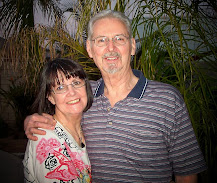Echoes of Gratitude
 I found my "Gratitude Journal," a few months ago. I think I made ten or eleven entries several years back. I started again in April of this year and then it got put away when we had the house painted.
I found my "Gratitude Journal," a few months ago. I think I made ten or eleven entries several years back. I started again in April of this year and then it got put away when we had the house painted.
On the front page of the newspaper this morning was an article entitled, "Being Happier Stumps Science," (Malcolm Ritter, AP science writer). The article is quite lengthy but worth looking up. The premise is that studies show "for decades, a widely accepted view has been that people are stuck with a basic setting on their happiness thermostat. It says the effects of good or bad life events like marriage, a raise, divorce, or disability will simply fade with time.
We adapt to them just like we stop noticing a bad odor ...after a while. ...But recent long-term studies have revealed that the happiness thermostat is more malleable than the popular theory maintained, at least in its extreme form. 'Set-point is not destiny,' says psychologist Ed Diener of the University of Illinois.
As a motivation speaker and executive coach, Caroline Adams Miller knows a few things about using mental exercises to achieve goals. But last year, one exercise she was asked to try took her by surprise.
Every night, she was to think of three good things that happened that day and analyze why they occurred. That was supposed to increase her overall happiness.
'I thought it was too simple to be effective,' said Miller. 'I went to Harvard. I'm used to things being complicated.'
Miller was assigned the task as homework in a master's degree program. But as a chronic worrier, she knew she could use the kind of boost the exercise was supposed to deliver.
She got it.
'The quality of my dreams has changed, I never have trouble falling asleep and I do feel happier.'
she said.
Results may vary, as they say in the weight-loss ads. But that exercise is one of several that have shown preliminary promise in recent research into how people can make themselves happier - not just for a day or two, but longterm. It's part of a larger body of work that challenges a long-standing skepticism about whether that's even possible.
The think-of-three good things exercise that Miller, the motivations speaker, found so simplistic at first is among those being tested at the University of Pennsylvania.
People keep doing it on their own because it's immediately rewarding. It makes people focus more on good things that happen, which might otherwise be forgotten because of daily disappointments.
Miller said the exercise made her notice more good things in her day, and that now she routinely lists 10 or 20 of them rather than just three.
Any long-term effect will probably depend on people continuing to work at it, just as folks who move to Southern California can lose their appreciation of the ocean and weather unless they pursue activities that highlight those natural benefits, said Sonja Lyubomirsky, a psychologist at the University of Riverside.
'Happiness is the process, not the place', says Diener. 'So many of us think that when we get everything just right, and obtain certain goals and circumstances, everything will be in place and we will be happy...but once we get everything in place, we still need new goals and activities. The Princess could not just stop when she got the Prince.' "
~~~~~~~~~~~~~~~~~~~~~~~~~~~~~~~~~~~~~~~~~~~~~~~~~~~~~~
So, in light of this, I think it's time I seek out my gratitude journal and begin finding at least three things to be grateful for everyday!



















No comments:
Post a Comment